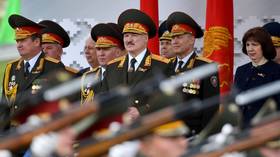Belarus could host nuclear weapons

Belarus has unveiled its proposed new constitution, opening up the possibility of the country stationing nuclear weapons on its territory and potentially enabling veteran leader Alexander Lukashenko to stay in office until 2035.
The changes, which were promised in the wake of the unrest that followed last year’s disputed presidential election, were released for public debate on Monday.
Among the proposed changes, a passage in the current constitution that requires the country to stay out of major geopolitical conflicts appears to have been removed. According to the existing version, last modified in 2004, Belarus “aims at making its territory a nuclear-free zone, and the state – neutral.” However, in the latest draft the section has been replaced by a pledge that “rules out military aggression from its territory against other states,” opening up speculation that Minsk could allow atomic weapons to be deployed within its borders.
In addition, if approved, the new constitution would bring in term limits for presidents, restricting them to two five-year stretches in office. However, a clause in the text stipulates that this only applies to “newly elected presidents,” which would potentially allow Lukashenko to stay in office for another decade after his current term expires in 2025. Lukashenko has governed the Eastern European nation for more than 27 years.
The amendments, which are subject to public consultation, tighten up requirements for Belarusian citizens seeking to be elected as the country’s president, bumping the minimum age from 35 to 40 years, as well as increasing the required period of permanent residency from 10 to 20 years ahead of the election.
Individuals who have held, or hold, dual citizenship or residency permits in foreign countries would be disqualified from running for office. The draft document also envisions immunity for former presidents, and grants them the perk of becoming a lifetime senator.
The process of reforming the constitution has been repeatedly presented by Lukashenko as a precursor to him stepping down from the country’s top job. According to him, the task “cannot be given to an unknown president,” as it would be a “disaster.”
However, a number of opposition figures have claimed that the changes amount to little more than a delay tactic, designed to shield him from calls to resign following widespread street protests after he was declared the victor in last summer’s election, with around 80% of the vote. The opposition, and many international observers, insist the poll was rigged.
The constitutional changes would also empower the so-called All-Belarusian People’s Assembly, which is currently a general meeting of the Belarusian government with top officials and industry leaders held every five years. The assembly lacks any real powers, with its critics claiming it only serves to demonstrate the alleged universal support for the Belarusian leadership.
Under the new constitution, however, the assembly would get a vast number of different powers. It would be able to depose a president found guilty of “systematic” violation of the constitution or other “serious offense,” establish guidelines for foreign and internal politics, set military doctrine, and adopt other program documents.
The assembly would also be able to throw out any act by any governing body or official – except for court rulings – should it consider them unfit for the interests of “national security.” The draft also defines marriage as a “union between a man and a woman.”
Following the public debate and any potential revisions, the changes will be put to a referendum, expected to be held in February next year. The amendments need to garner the support of more than 50% of voters, with at least half of all citizens turning out to vote.












